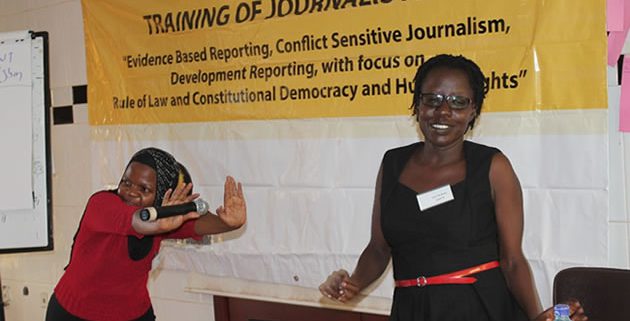Training of journalists for Northern Uganda on evidence based reporting, conflict sensitive journalism, development reporting
Media Council of Uganda with support from UNDP organised a training that attracted 33 Journalists from northern Uganda, 27 male and 6 female out of the targeted 40 participants from 8 Districts of Lira, Gulu, Moroto, Kitgum, Sororti, Kotido,Abim, and Dokolo. It is conducted under the UNDP and Government of Uganda Programme; Rule of Law and Constitutional Democracy (RLCD).
The Chairperson Uganda Media Council Mr. Paulo Ekochu; represented by Council Member Mr. Venis Omona opened the training. He said this was an intervention to improve quality of media content in Uganda after conducting an assessment in 2016 during the 9 regional media dialogue sessions with close to 700 media practitioners. Mr Omona said journalists play a critical role of the voice of the voiceless, overseers of accountability to the citizens, and bridge of development are called upon to be professional and this is what the Media Council of Uganda is targeting.
The Permanent Secretary Ministry of Information, Communication, Technology and National Guidance, Mr. Vincent Bagire was represented by the Principal Information Officer and Secretary to Media Council Pius Mwinganisa. He highlighted the streamlining of the media regulatory agencies under one ministry as a way to strengthen the Media. He said Uganda Vision 2040 which feeds into Second National Development Plan (NDP II) emphasises the central role of the media in supporting the country’s socio-economic transformation and institutional strength. He noted that quality of media content is faced with the test of new media often called social media; its effects on traditional media continues to increasing and therefore journalists have to be more vigilant in professional practice with facts, balanced reporting and constant improvement in the use of new technologies.
UNDP Country Director Ms. Almaz Gebru recognized the vital role of the media keeping communities informed, educated and well-informed people ensure deepening democracy, participation of citizens and transparency by those holding public offices. In her speech presented by Ms Florence Ochola, she accentuated UN/UNDP’s commitment to work with and support the media as an essential communication tool to enable positive mindset of societies. She implored the media to minimize on sensational or sleaze reporting and deliberately shape the development agenda of Uganda. She pointed out key aspects as: fostering social engagement, sustaining a culture of constitutional democracy and rule of law; enable access to public information; empower the public to demand and meet their obligations; messaging that fosters protection of human rights, conflict sensitive situations but also nature affirmative action for women, youth, and marginalized groups.

Trainers demonstrating to journalists regarding evidence reporting in Gulu
The Team Leader Gulu UN-Human Rights Commission Mr. Peter Mefor encouraged journalists to take their role of accountability seriously and perusing justice while presenting journalism with a human rights perspective.
During the training media practitioners were equipped with skills in the following areas: factual, balanced and well sourced reporting to strongly base on evidence; conflict sensitive reporting, professional, ethical practice and reporting that focuses on improving the lives of the people. Participants raised the journalists’ major practical dilemma of conflict of interest while reporting, nepotism, corruption in form of hand outs to journalists, invention of privacy and human rights violations of journalists by some leaders and some sections of society under mob action. The challenges associated with multiplicity of roles in media practice of, at times being a station manager, reporter, editor, talk-show moderator and program producer without adequate formal training and most without out contracts and inadequate remuneration; all of which participants said contribute to affecting quality of the media.
The training model on basic reporting covered the following: generating story ideas, identification and cultivation of sources, tools required for effective reporting. The module on rule of law, constitutional democracy and human rights focused on: understanding the laws that affect the practice of journalism in Uganda, the importance of the rule of law, journalists as human rights defenders and promotion of constitutionalism. The module of Media and Accountability covered; journalists as observers, ears and eyes in engaging community leaders, and government service providers; journalists owning their mistakes and taking corrective measure and being accountable to the people. The module on Evidence based reporting raised: how to base of facts and cross checking information; reliable sources and double checking facts and how to use internet and getting correct data to support the information from sources. The Model on development reporting covered: appreciation of the role of the media in development, information to empower local communities amidst competing story ideas. The Module on Conflict sensitive reporting focused on: journalism balancing side in conflict situations, avoiding escalating conflict and inflammatory language and how journalists are to safe guard themselves in conflict situation, clear identification and introduction to leaders in the communities.
The Participants committed to follow-up the training with documentation of their reports along the indicators of the training modules, work with Media Council of Uganda to monitor improvement in reporting on a quarterly basis. Council Members represented by Mr. Venis Omona, Mr. Peter J. Okello, and Ms. Lindah Waboka Nabusayi committed to work with journalists and partner with other agencies to continue improving the media legal and policy environment in Uganda.

Media Council Member Secretary, Pius Mwinganisa (right) with Council Members Ms Lindah Wanboka Nabusayi and Mr. Venis Omona(Left) monitoring the training of Journalists in Gulu



Leave a Reply
Want to join the discussion?Feel free to contribute!